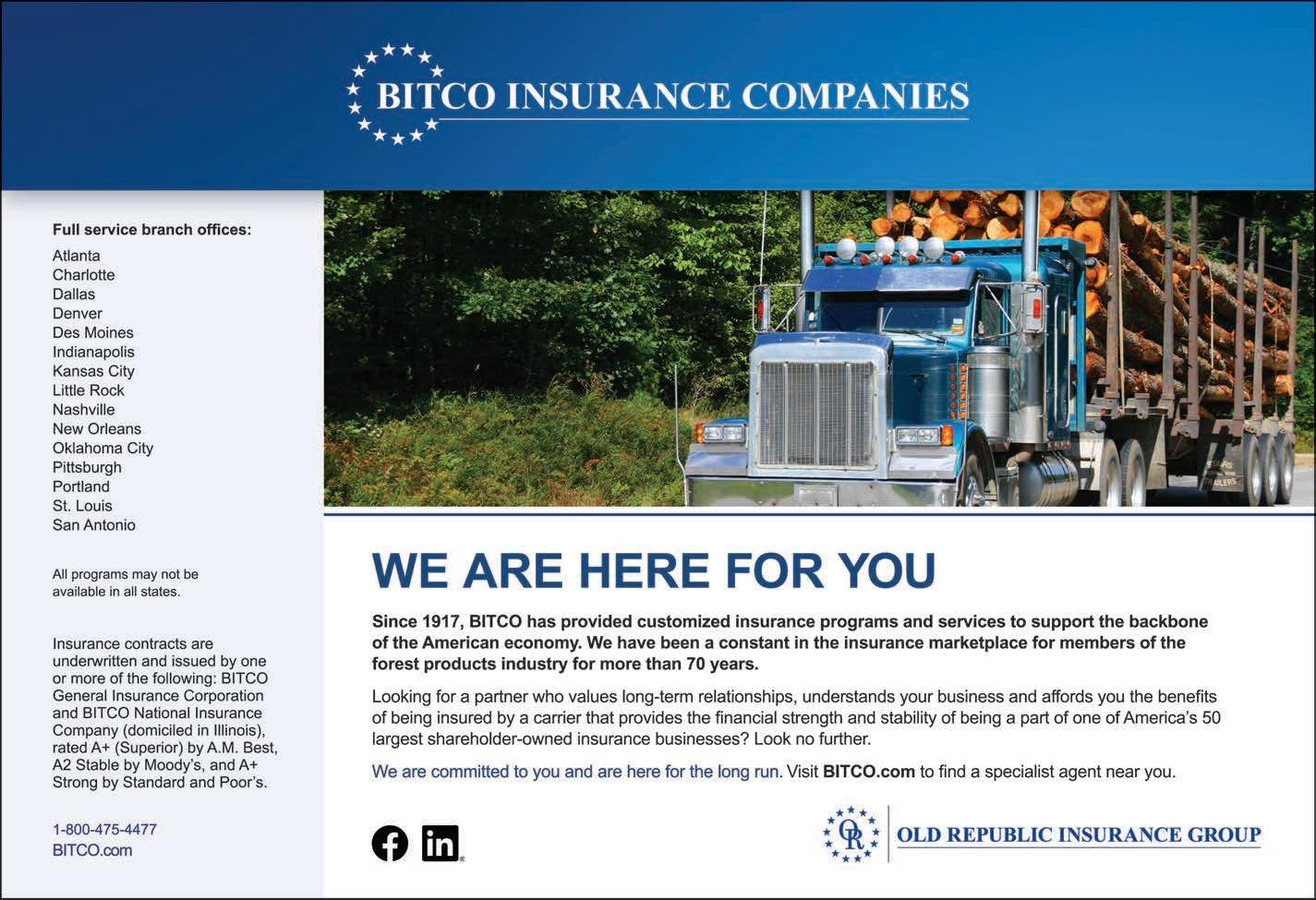
9 minute read
COVID Tips
COVID-19 FAQ
■ CDC and OSHA release facts and guidelines about COVID-19 vaccines.
NOTE: This information from late January, 2021, is courtesy of the Virginia Loggers Assn. and the Carolina Loggers Assn., and was originally provided by the Centers for Disease Control & Prevention and the U.S. Dept. of Labor.
Can a COVID-19 vaccine make me sick with COVID-19?
No. None of the authorized and recommended COVID-19 vaccines or COVID-19 vaccines currently in development in the United States contain the live virus that causes COVID-19. This means that a COVID-19 vaccine cannot make you sick with COVID-19. There are several different types of vaccines in development. All of them teach our immune systems how to recognize and fight the virus that causes COVID-19. Sometimes this process can cause symptoms, such as fever. These symptoms are normal and are a sign that the body is building protection against the virus that causes COVID-19. It typically takes a few weeks for the body to build immunity (protection against the virus that causes COVID-19) after vaccination. That means it’s possible a person could be infected with the virus that causes COVID-19 just before or just after vaccination and still get sick. This is because the vaccine has not had enough time to provide protection.
After getting a COVID-19 vaccine, will I test positive for COVID-19 on a viral test?
No. Neither the recently authorized and recommended vaccines nor the other COVID-19 vaccines currently in clinical trials in the United States can cause you to test positive on viral tests, which are used to see if you have a current infection. If your body develops an immune response—the goal of vaccination—there is a possibility you may test positive on some antibody tests. Antibody tests indicate you had a previous infection and that you may have some level of protection against the virus. Experts are currently looking at how COVID-19 vaccination may affect antibody testing results.
If I have already had COVID19 and recovered, do I still need to get vaccinated with a COVID19 vaccine?
Yes. Due to the severe health risks associated with COVID-19 and the fact that re-infection with COVID-19 is possible, vaccine should be offered to you regardless of whether you already had COVID-19 infection. At this time, experts do not know how long someone is protected from getting sick again after recovering from COVID-19. The immunity someone gains from having an infection, called natural immunity, varies from person to person. Some early evidence suggests natural immunity may not last very long. We won’t know how long immunity produced by vaccination lasts until we have more data on how well the vaccines work. Both natural immunity and vaccine-induced immunity are important aspects of COVID-19 that experts are trying to learn more about, and CDC will keep the public informed as new evidence becomes available.
Will a COVID-19 vaccination protect me from getting sick with COVID-19?
Yes. COVID-19 vaccination works by teaching your immune system how to recognize and fight the virus that causes COVID-19, and this protects you from getting sick with COVID-19. Being protected from getting sick is important because even though many people with COVID-19 have only a mild illness, others may get a severe illness, have long-term health effects, or even die. There is no way to know how COVID-19 will affect you, even if you don’t have an increased risk of developing severe complications.
Will a COVID-19 vaccine alter my DNA?
No. COVID-19 mRNA vaccines do not change or interact with your DNA in any way. Messenger RNA vaccines—also called mRNA vaccines—are the first COVID-19 vaccines authorized for use in the United States. mRNA vaccines teach our cells how to make a protein that triggers an immune response. The mRNA from a COVID-19 vaccine never enters the nucleus of the cell, which is where our DNA is kept. This means the mRNA cannot affect or interact with our DNA in any way. Instead, COVID-19 mRNA vaccines work with the body’s natural defenses to safely develop immunity to disease. At the end of the process, our bodies have learned how to protect against future infection. That immune response and making antibodies is what protects us from getting infected if the real virus enters our bodies.
Is it safe for me to get a COVID19 vaccine if I would like to have a baby one day?
Yes. People who want to get pregnant in the future may receive the COVID-19 vaccine. Based on current knowledge, experts believe that COVID-19 vaccines are unlikely to pose a risk to a person trying to become pregnant in the short or long term. Scientists study every vaccine carefully for side effects immediately and for years afterward. The COVID-19 vaccines are being studied carefully now and will continue to be studied for many years, similar to other vaccines. The COVID-19 vaccine, like other vaccines, works by training our bodies to develop antibodies to fight against the virus that causes COVID-19, to prevent future illness. There is currently no evidence that antibodies formed from COVID-19 vaccination cause any problems with pregnancy, including the development of the placenta. In addition, there is no evidence suggesting that fertility problems are a side effect of ANY vaccine. People who are trying to become pregnant now or who plan to try in the future may receive the COVID-19 vaccine when it becomes available to them. For more information about COVID 19 vaccinations, please visit the Virginia Department of Health website at https://www.vdh.virginia.gov/ covid-19-vaccine/Vaccinations:
COVID 19 vs Regular Flu
The following information was provided by the office of Congressman Rob Wittman, who serves Virginia’s 1st Congressional District.
What is the difference between the flu vaccine and the COVID-19 vaccine?
Getting a flu shot is the best way to protect yourself from the flu. Flu can cause serious illness, especially in older adults and infants. While the flu vaccine won’t prevent COVID-19, it is one thing we all can do to stay healthy this winter.
The flu vaccine is available at pharmacies and doctor’s offices and should be taken every year in the fall or winter. The COVID-19 vaccine will help prevent you from getting COVID-19. COVID-19 vaccines started coming to Virginia in December 2020, but it will take a while before they are easily available to the public.
Does the flu vaccine protect me against COVID-19?
No. Each of these diseases are caused by different viruses. While the flu vaccine won’t protect you from COVID-19, it will protect you from getting sick from the flu. Flu is a serious virus that causes deaths every year, especially among older adults and infants. Most people older than six months should get the flu vaccine every year.
Is the flu shot important to get this year?
It’s important to get a flu vaccine this year to make sure you don’t get the flu when doctors’ offices and hospitals are already crowded with COVID-19 patients. By getting a flu vaccine, you can help keep yourself healthy and give healthcare workers time to focus on COVID19. It is possible to get both the flu and COVID-19 at the same time.
Can I get the flu vaccine if I have COVID-19 symptoms?
If you think you have symptoms of COVID-19, get tested as soon as possible. You can check your symptoms online at www.vdh. virginia.gov/COVID check and find out where you can be tested.
If you do have COVID-19 symptoms, wait 14 days from the time your symptoms end before getting a flu vaccine. There is no evidence that it’s dangerous to get a flu vaccine while you have COVID-19, but you could spread the coronavirus to

Where can I get the flu shot?
You can get a flu shot from your healthcare provider or just about any pharmacy. Some public providers offer the flu vaccine for free.
OSHA Guidelines
The U.S. Department of Labor announced that its Occupational Safety and Health Administration has issued stronger worker safety guidance to help employers and workers implement a coronavirus prevention program and better identify risks which could lead to exposure and contraction. President Biden directed OSHA to release clear guidance for employers to help keep workers safe from COVID-19 exposure.
“Protecting Workers: Guidance on Mitigating and Preventing the Spread of COVID-19 in the Workplace” provides updated guidance and recommendations, and outlines existing safety and health standards. OSHA is providing the recommendations to assist employers in providing a safe and healthful workplace. “More than 400,000 Americans have died from COVID-19 and millions of people are out of work as a result of this crisis. Employers and workers can help our nation fight and overcome this deadly pandemic by committing themselves to making their workplaces as safe as possible,” said Senior Counselor to the Secretary of Labor M. Patricia Smith. “The recommendations in OSHA’s updated guidance will help us defeat the virus, strengthen our economy and bring an end to the staggering human and economic toll that the coronavirus has taken on our nation.” Implementing a coronavirus prevention program is the most effective way to reduce the spread of the virus. The guidance announced today recommends several essential elements in a prevention program: Conduct a hazard assessment. Identify control measures to limit the spread of the virus. Adopt policies for employee absences that don’t punish workers as a way to encourage potentially infected workers to remain home. Ensure that coronavirus policies and procedures are communicated to both English and non-English speaking workers. Implement protections from retaliation for workers who raise coronavirus-related concerns. “OSHA is updating its guidance to reduce the risk of transmission of the coronavirus and improve worker protections so businesses can operate safely and employees can stay safe and working,” said Principal Deputy Assistant Secretary for Occupational Safety and Health Jim Frederick. The guidance details key measures for limiting coronavirus’s spread, including ensuring infected or potentially infected people are not in the workplace, implementing and following physical distancing protocols and using surgical masks or cloth face coverings. It also provides guidance on use of personal protective equipment, improving ventilation, good hygiene and routine cleaning. OSHA will update today’s guidance as developments in science, best practices and standards warrant. This guidance is not a standard or regulation, and it creates no new legal obligations. It contains recommendations as well as descriptions of existing mandatory safety and health standards. The recommendations are advisory in nature, informational in content and are intended to assist employers in recognizing and abating hazards likely to cause death or serious physical harm as part of their obligation to provide a safe and healthful workplace. Under the Occupational Safety and Health Act of 1970, employers are responsible for providing safe and healthful workplaces for their employees. OSHA’s role is to help ensure these conditions for America’s working men and women by setting and enforcing standards, and providing training, education and assistance. SLT












